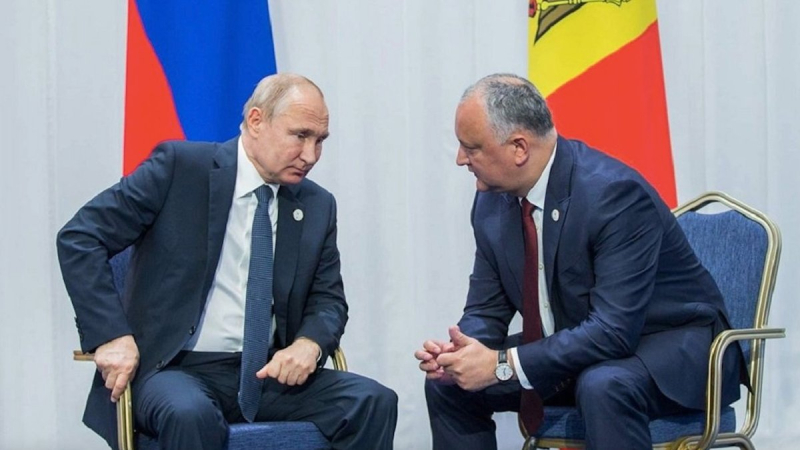
Russian agent of influence Dodon was arrested in Moldova/RosSMI
On May 24, the media spread reports of searches in the house and offices of the former Moldovan President Igor Dodon, it was also announced that this politician had been arrested by Moldovan law enforcement officers, which later began to be actively denied by Russian propagandists.
Criminal proceedings are connected with corruption and the Moldovan oligarch Igor Plahotniuc, who, according to the investigation, transferred money to Dodon.
Crimean trace
It is worth recalling that Dodon’s pro-Russian views have never been a secret, but in 2016 he illegally stated at a televised debate that supposedly “Crimea belongs to Russia.” Then these statements were disavowed by the Moldovan Foreign Ministry, but in general, the attitude of the Dodon authorities towards Ukraine has always been at least cool, and the Kremlin remained the main partner of his government.
At the same time, the Crimean collaborators, the key of which are Vladimir Konstantinov and Sergey Aksyonov – are of Moldovan origin and have close commercial contacts with this republic, were actively used by the Kremlin in the relevant direction.
During 2020 – 2021, the ARC repeatedly wrote about their close connection with the criminal and pro-Russian circles of Moldova on both banks of the Dniester.
In particular, there were attempts to use the Danube port of Moldova, Giurgiulesti, for importing products of the chemical industry of Crimea into the European Union, bypassing the sanctions, and ships flying the Moldovan flag were seen as violating the ban on entering Crimean ports.
Cossack robbers
h3>
In February 2021, the ARC reported that the criminal Valery Gratov “surfaced” in Moldova, used by the Russian special services in 2014, when he coordinated and sent pro-Russian “veterans” to Crimea to facilitate the attempted annexation of the peninsula.
And back in 2020, the “Cossacks of Crimea and Sevastopol” controlled by the aggressor’s special services united into a “single Black Sea Cossack army,” as reported by the press service of the fake “head of the Republic of Crimea.” Sergei Aksyonov himself then stated that, of course, it was possible to create a “Cossack army” on the peninsula “exclusively thanks to the decision of Vladimir Putin.”The specificity of the situation was that a similar structure with the same name has been operating in Russian-occupied Tiraspol since 1992, and the obvious intention of the Russian special services was to “unify” the “Roman and Dniester Cossacks” as controlled paramilitary structures.
In March 2022, statements began to be heard from Crimean collaborators that Crimea would allegedly become a “railway hub” in Russia's communication with Odessa and Nikolaev, and further with Moldova.
“Moldovan” vector
The “Moldovan” vector of Russian aggression intensified after the change by the aggressor in April 2022 of the administrative vertical of the “special operation” against Ukraine and the appointment of the only commander of the Army General Alexander Dvornikov, whose “work” in Syria was specifically based on paramilitary structures and mercenaries.
After the announcement by Russian generals of criminal plans to “exit to the borders of Moldova” and to fake “protection of the Russian-speaking population of Transnistria”, a series of “terrorist acts” obviously orchestrated by the Kremlin was carried out in the Russian-occupied regions of the republic.
At the same time, as already reported, experts are skeptical about the prospects of the special sabotage operation launched by the aggressor in Moldova, in particular, the Russian-occupied areas close to the Odessa region.
At the same time, the Crimean collaborators were given the task of maximizing their own connections in criminal circles Moldova in order to facilitate Russian aggression and hypothetical occupation of Chisinau.
Only words
On April 22, representatives of the invaders made several statements regarding the occupied territories of Ukraine and Moldova.
In particular, Rustam Minnekaev, acting commander of the Central Military District of Russia, who, according to media reports, is currently can become the commander of this district of the aggressor
In parallel, individual deputies of the Russian State Duma announced the alleged prospects of “recognition” of the so-called “Pridnestrovian Moldavian Republic.” In April-May 2022, contacts between the European Union and the United States with the Chisinau authorities intensified, and Moldovan President Maia Sandu recognized Russia's invasion of Ukraine as aggression.
Now even Russian propaganda admits that that in order to “help Tiraspol” Russia needs the criminal capture of Odessa and Nikolaev, which remains an unattainable prospect for the aggressor.
Obviously, it is the situation at the front that causes the “vector change” in Chisinau and the government's understanding of the reality of preserving Moldova's sovereignty in the context of strengthening its cooperation with NATO and Ukraine.
It is worth predicting that the intensification of the fight against corruption among pro-Russian politicians will intensify in Bulgaria, the relevant materials about the president of which were published by the ARC.
p>

